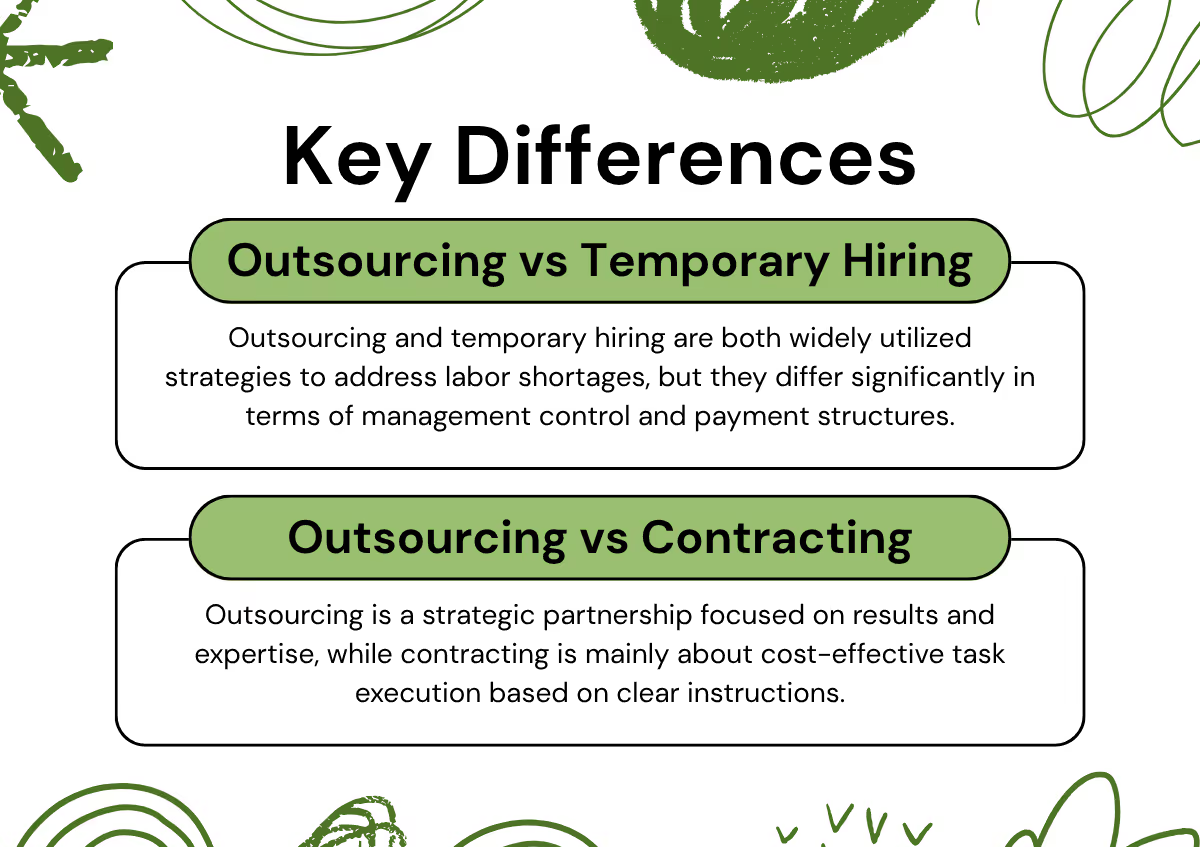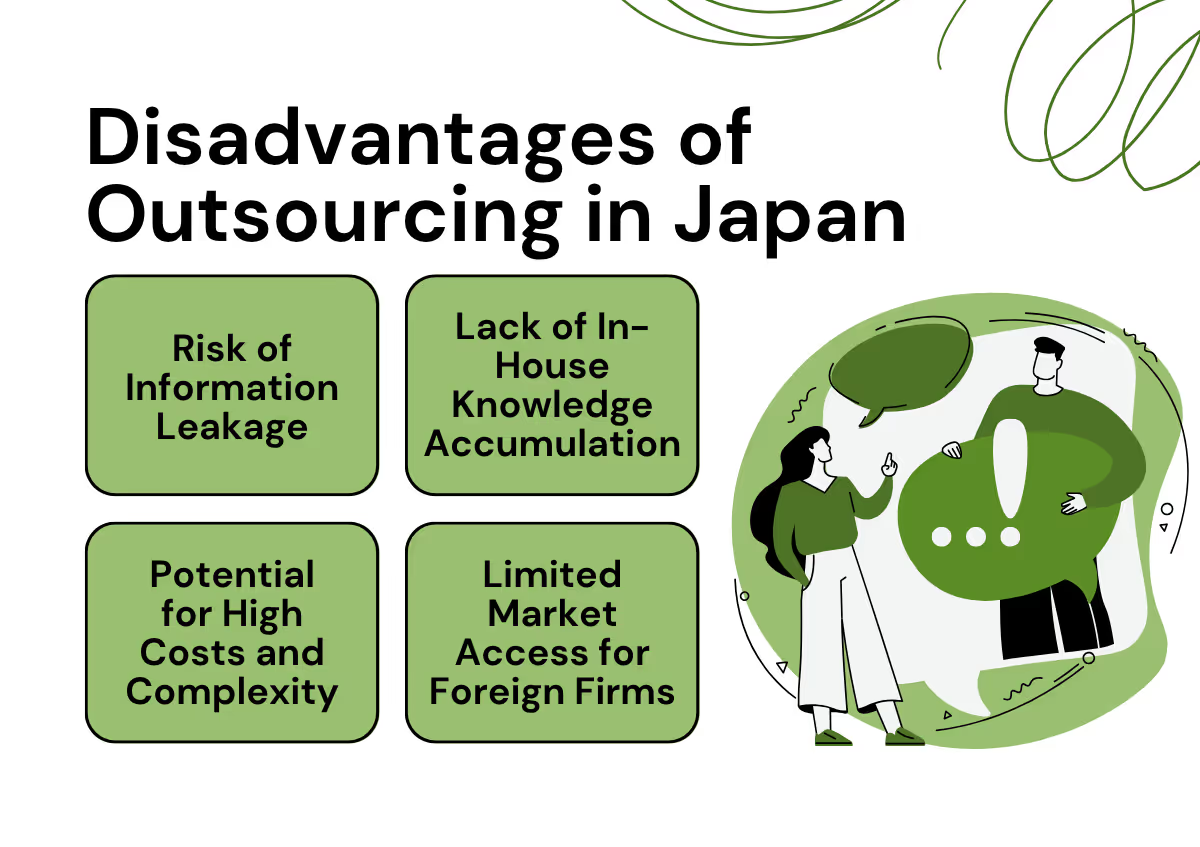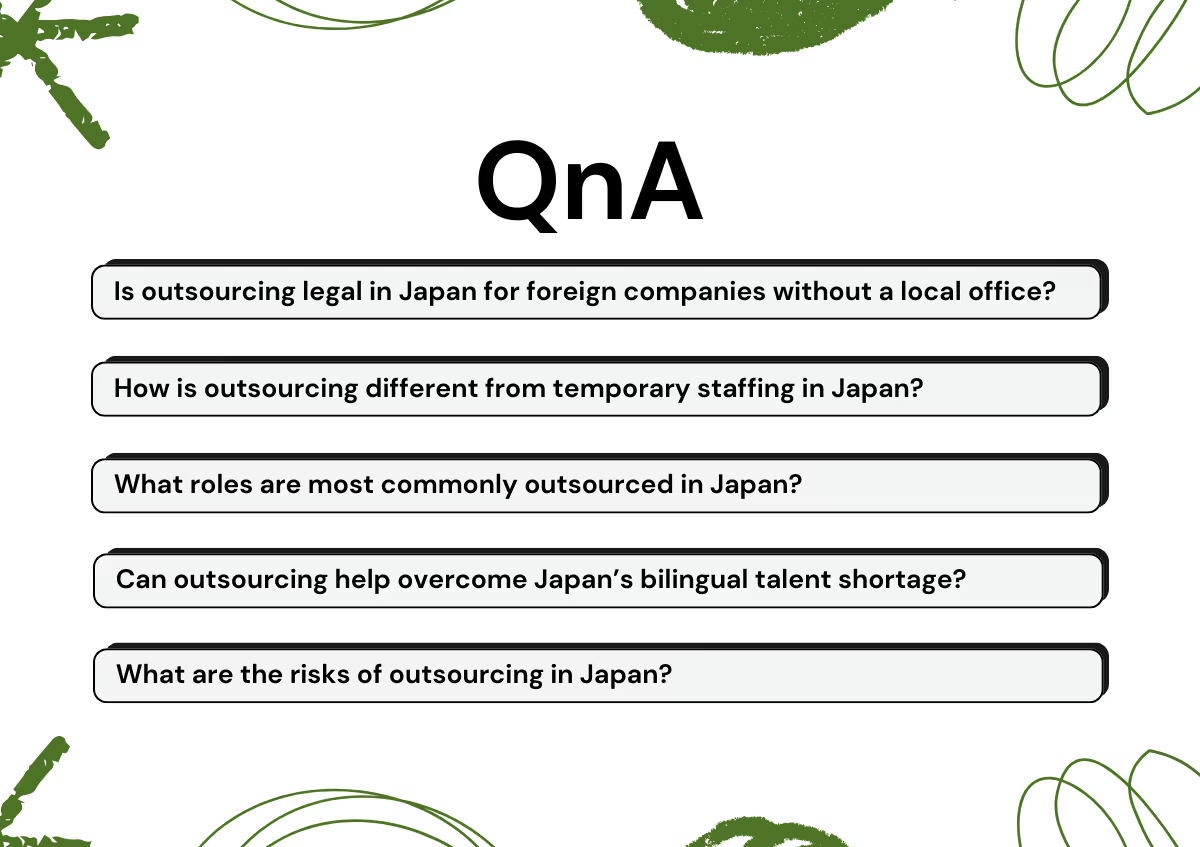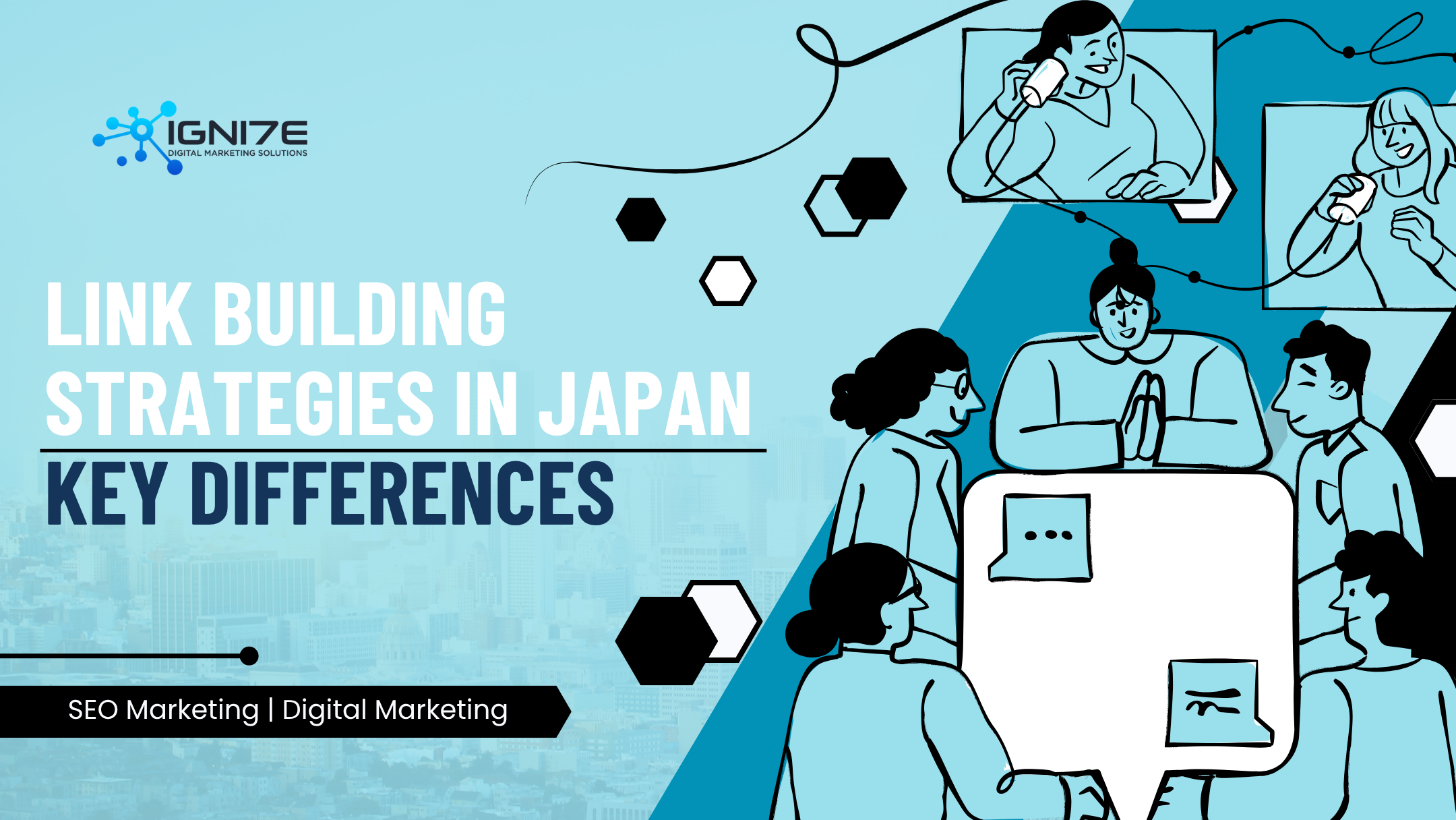Outsourcing in Japan: What International Companies Need to Know

Entering the Japanese market offers tremendous potential, but foreign companies often encounter unexpected hurdles, particularly when it comes to hiring and integrating their workforce. Japan’s labor market is shaped by cultural expectations, legal regulations, and a deep-rooted preference for job security and long-term employment, making it challenging for non-Japanese businesses to attract and retain talent.
Outsourcing presents a practical and strategic solution to these challenges. It enables international companies to navigate Japan’s complex employment landscape without having to directly manage traditional benefits or secure bilingual talent for every position. By partnering with experienced local agencies, foreign firms gain access to specialized, bilingual teams while avoiding the legal and cultural barriers that come with direct hiring. This blog explores the unique advantages of outsourcing in Japan, the common pitfalls foreign companies face, and how outsourcing can help bridge the gap between global business models and local expectations.
Understanding Japan’s Outsourcing Landscape

Japan's outsourcing landscape has undergone significant evolution over the past few years, driven by labor shortages and the growing complexity of business operations. Outsourcing has become a key strategy for businesses looking to streamline operations and maintain competitiveness. Due to the shrinking labor force, Japanese companies are turning to outsourcing as a solution to fill skill gaps, particularly in areas like IT, human resources, and administrative tasks. By leveraging external expertise, businesses can focus on innovation and core activities while reducing costs and operational burdens.
For international companies, outsourcing in Japan presents not only an operational advantage but a culturally strategic one. Due to strict labor laws and a cultural preference for job stability, foreign businesses often struggle to attract Japanese workers. Outsourcing offers a legal and flexible way to engage local talent without directly competing with traditional Japanese companies in terms of benefits, job security, and long-term employment prospects.
As Japan continues to face demographic challenges, outsourcing is poised to play an increasingly important role across various industries. From IT and customer service to recruitment, more companies are turning to external specialists to manage non-core functions. Doing so helps address immediate workforce shortages while also providing access to advanced technologies and specialised expertise that can be costly or difficult to sustain internally. The outsourcing model is gaining momentum, reshaping how businesses in Japan adapt to a rapidly evolving landscape.
What is Outsourcing and Why is it Popular in Japan?
Outsourcing—the delegation of business functions to third-party providers—has seen rapid growth in Japan, driven by economic pressures and a shrinking labour force. A key advantage is the ability for companies to concentrate on core operations while external partners manage specialised or routine tasks. Such an approach improves efficiency and reduces the need for large internal teams, particularly in departments like HR and IT.
With Japan’s ageing population and ongoing worker shortages, many businesses are turning to outsourcing to fill talent gaps. As of 2022, more than half of companies reported full-time staff shortages, a problem worsened by the COVID-19 pandemic. Outsourcing has become a vital solution, especially for functions like payroll and HR that require significant manpower.
Cultural and economic shifts have also made businesses more open to external support. As digital transformation accelerates, demand for niche expertise has grown, reshaping outsourcing from a cost-saving tactic into a core element of competitive strategy in Japan’s evolving business landscape.
Types of Outsourcing: ITO, BPO, and KPO at a Glance
Outsourcing in Japan typically falls into three categories:
- ITO (Information Technology Outsourcing): Delegating IT tasks like infrastructure management, cloud computing, and cybersecurity to specialized providers. Especially helpful for SMEs looking to access advanced tech without in-house teams.
- BPO (Business Process Outsourcing): Covers routine, non-core tasks such as payroll, HR, and customer support. Widely used to boost operational efficiency and ensure compliance with Japan’s detailed regulations.
- KPO (Knowledge Process Outsourcing): Involves high-level services like data analytics, market research, and legal or scientific consulting. Ideal for accessing global expertise without hiring full-time specialists.
These models help foreign and domestic companies scale strategically, improve flexibility, and address labor shortages through targeted external support.
Key Industries Utilizing Outsourcing
Several key industries in Japan have embraced outsourcing to remain competitive and agile in the face of workforce constraints and the growing complexity of modern business operations.
IT Industry: The most prominent sector utilizing outsourcing in Japan is the information technology (IT) industry. With the advent of digital transformation, there has been a surge in demand for IT services and solutions, but companies often lack the internal resources to meet these needs. As a result, many businesses adopt full-scale outsourcing for IT operations, covering areas such as system development, cloud management, cybersecurity, and maintenance. Known as full outsourcing, this model involves delegating nearly all IT functions to a specialised provider. Outsourcing IT fills skill gaps while providing companies with access to the latest technologies and innovations, without the need for significant in-house investment.
Human Resources (HR) and Recruitment: The HR sector is another primary beneficiary of outsourcing in Japan. Recruitment outsourcing has become increasingly common, especially in large organizations that need to review hundreds or even thousands of applicants. By outsourcing initial screening processes, companies can reduce the burden on their internal HR teams, allowing them to focus on more strategic tasks, such as employee engagement and development. However, companies often retain final hiring decisions in-house to ensure alignment with corporate culture and goals. Outsourcing also extends to payroll processing, benefits administration, and compliance management, further easing the operational load on internal HR teams.
Finance and Administrative Functions: Outsourcing is also highly prevalent in administrative and back-office functions such as finance, accounting, and legal compliance. These roles involve repetitive and time-consuming tasks, such as data entry and transaction processing, which can be efficiently outsourced. By doing so, businesses can streamline operations, reduce human error, and enhance compliance with regulatory standards. Legal outsourcing, particularly in areas such as contract management and legal research, has grown significantly, allowing businesses to manage complex legal requirements without expanding their in-house teams.
Customer Service: Call center outsourcing is another area that has seen widespread adoption in Japan. Running an in-house call center requires substantial investment in infrastructure, technology, and personnel, particularly to handle fluctuations in call volume. Many businesses also choose to extend these services into outsourced telemarketing, which helps companies reach new customers while maintaining the cultural sensitivity and politeness expected in Japanese communication. Whether for inbound or outbound interactions, outsourcing customer service functions provides scalability, reduces overhead, and ensures a consistent standard of care across all touchpoints.
These industries showcase the diverse and strategic application of outsourcing in Japan, with each sector leveraging external expertise to meet specific operational needs, reduce costs, and improve flexibility.
The Difference Between Outsourcing, Temporary Hiring, & Contracting in Japan

In Japan, companies often use various employment models, such as outsourcing, temporary hiring, and contracting, to address labor shortages and improve operational efficiency. However, these approaches differ significantly in terms of management control, responsibility, and payment structures. While outsourcing typically involves contracting specialized tasks to external companies, where the outsourcing provider handles the management and execution of the work, temporary hiring places workers directly under the client company’s supervision. Contracting, on the other hand, emphasizes the completion of project-based work, making it distinct from both outsourcing and temporary staffing models.
Understanding these differences is crucial for international companies navigating Japan’s employment landscape. Outsourcing offers strategic advantages by providing external expertise and reducing the burden on internal resources. Temporary hiring solves short-term labor shortages, while contracting focuses on delivering specific project outcomes. Recognizing which method to employ can significantly impact a company’s operational success and compliance with Japanese labor regulations.
Outsourcing vs. Temporary Hiring: Key Differences
Outsourcing and temporary hiring are both widely utilized strategies to address labor shortages, but they differ significantly in terms of management control and payment structures. Temporary hiring, also known as dispatch work or “haken” (派遣) in Japan, involves hiring personnel through a staffing agency to perform tasks within the company. These workers operate under the direct supervision and instruction of the company, making them subject to internal management. On the other hand, in outsourcing, the external company takes complete control of managing the work process, leaving the client company uninvolved in directing the personnel.
A key legal consideration is that if a company provides direct instructions to outsourced workers without going through the outsourcing provider, it could result in “disguised contracting” or “giso ukeoi” (偽装請負), which is illegal in Japan.
The payment structure also differs. For temporary hiring, compensation is based on the number of working hours, where the company pays for the time actually worked. Conversely, in outsourcing, compensation often depends on the completion of specific deliverables or tasks. Such an arrangement allows for greater adaptability to fluctuating workloads, unlike temporary hiring, which is usually based on time-based compensation.
Outsourcing vs. Contracting: A Detailed Comparison
The terms "outsourcing" and "contracting" or “gaichu” (外注) are often used interchangeably, but they represent different approaches. Contracting focuses more on achieving cost savings through the completion of external tasks based on detailed instructions. Outsourcing, however, involves a more strategic relationship, where the external provider takes responsibility for planning, designing, and executing a particular service or function.
In contracting, the company typically seeks to cut costs by assigning tasks that do not necessarily contribute to long-term strategic goals. Outsourcing, however, may not always lead to direct cost savings but aims to enhance the company’s value through external expertise and specialization.
A further distinction lies in the type of contracts. Outsourcing often involves “work contracts” known as ukeoi (請負) or “mandate contracts” called inin (委任), which emphasise the successful completion of a task or project. In contrast, contracting usually focuses on straightforward, manual task execution with minimal strategic involvement. Such a difference makes outsourcing more suitable for businesses aiming to delegate entire functions that require specialised skills, whereas contracting is geared toward efficient task completion.
Challenges for Foreign Companies in the Japanese Hiring Market

While Japan offers immense opportunities for international businesses, boasting the world’s fourth-largest GDP and a tech-savvy consumer base, recruiting local talent remains one of the most challenging hurdles. Foreign companies are often unprepared for the nuanced employment landscape and cultural expectations unique to Japan. Below are several key reasons why hiring in Japan can be particularly challenging for non-Japanese firms:
Deeply Rooted Preference for Lifetime Employment
Japanese workers tend to value long-term employment and job security more than their global counterparts. The country’s employment culture has long operated under a lifetime employment model, where promotions and wage increases are typically based on seniority rather than performance. Such a system fosters loyalty and stability, making employees less likely to change jobs even when presented with potentially higher-paying opportunities.
Cultural preferences like these pose a challenge for foreign companies, which often emphasise merit-based progression and offer performance-driven contracts that may lack the traditional benefits and long-term stability Japanese employees expect. Unlike domestic firms, many international companies operating in Japan do not provide structured retirement plans, comprehensive health insurance, or lifetime employment prospects. As a result, they may be perceived as less secure or less attractive workplaces, especially by mid-career professionals and older job seekers.
The resulting disparity discourages many qualified candidates from applying to foreign firms in the first place. According to recent surveys, Japan’s job-switching rate remains under 60%, compared to over 90% in Europe and North America. As workers age, psychological and financial barriers to changing employers become even greater, making it more difficult for foreign companies to attract experienced mid-career professionals.
Misalignment in Work Style and Expectations
Foreign companies may struggle to understand and adapt to Japan's traditional work values. While concepts like work-life balance are growing in popularity among younger Japanese workers, the reality is that many still value—or feel pressured into—long hours and organizational loyalty.
Additionally, foreign firms typically seek candidates who can contribute immediately, but many Japanese companies place strong emphasis on long-term development and on-the-job training. Such a contrast creates a mismatch—Japanese workers often expect structured support and clear paths for career growth, while foreign firms tend to prioritise independent, self-starting employees who can quickly adapt to an international environment.
Shortage of Bilingual and Globally-Minded Talent
Japan faces a well-documented shortage of candidates fluent in English, a key requirement for many international firms. According to global proficiency rankings, Japan ranks low in English skills, with significant gaps in speaking and writing in particular. Furthermore, the number of Japanese students studying abroad remains far lower than in other developed countries.
The dual deficit—language skills and global experience—greatly limits the available talent pool. Foreign companies seeking employees who can operate across languages and cultures often compete for a very small, high-demand segment of the workforce.
Recruitment Timing and Market Mismatch
The Japanese job-hunting schedule is heavily skewed toward recent university graduates, with recruitment concentrated in the summer of their third year. This structured, seasonal hiring cycle differs from the year-round recruitment model used by most foreign companies, leading to misaligned timelines and missed opportunities.
Moreover, mid-career hiring remains low in Japan, and labor mobility is minimal among workers over 50. Foreign companies may find it challenging to identify and attract experienced talent unless they synchronize their hiring practices with local norms.
Cultural and Organizational Differences
Japanese businesses tend to follow hierarchical, group-oriented structures, where harmony and consensus are highly valued. In contrast, foreign firms often encourage individualism, flat hierarchies, and performance-based recognition. These philosophical differences can cause friction during recruitment and onboarding, as prospective employees may hesitate to join an organization with unfamiliar management styles.
Additionally, foreign firms may operate as subsidiaries of global corporations with centralized decision-making, whereas Japanese companies often function under umbrella structures with localized autonomy. This mismatch in corporate governance can affect both hiring processes and daily operations.
Legal and Regulatory Complexities
Japan's labor laws are comprehensive and strict, with detailed requirements regarding overtime, annual leave, employment contracts, and social insurance. Foreign companies unfamiliar with Japan’s legal framework may find compliance to be both challenging and costly.
For example, employers must enroll workers in mandated programs such as health insurance and pension systems, which can lead to higher labor costs than what international companies are accustomed to in their home countries. Without a thorough understanding and adaptation, even well-intentioned foreign firms can unintentionally violate labor laws or undercut their attractiveness as an employer.
Barriers to Promoting Diversity and Inclusion
Despite some recent progress, Japan continues to lag in gender diversity, particularly in managerial roles, where women still represent less than 15% in many industries. Additionally, talent pools can vary widely between Tokyo and rural regions, requiring tailored, localized recruitment approaches.
Foreign companies often prioritize diversity and inclusion as part of their global hiring policies. However, translating those values into actionable recruitment strategies in Japan can be difficult without a strong understanding of regional, cultural, and systemic barriers. Effective copywriting plays a vital role in communicating these policies clearly and sensitively to resonate with local candidates and stakeholders.
The Benefits of Outsourcing in Japan

Outsourcing offers significant advantages for businesses in Japan, including enhanced focus and efficiency, substantial cost reductions, and access to specialized expertise. By leveraging external resources, companies can streamline their operations, optimize budgets, and foster innovation, ultimately leading to improved competitiveness in the market.
Enhanced Focus and Efficiency
Outsourcing allows companies operating in Japan to redirect their focus from routine operational tasks to core business strategies. By engaging external specialists to handle administrative and marketing functions, businesses can focus on broader objectives, such as customer engagement and market expansion. This approach boosts productivity by allowing management to focus on high-impact tasks that drive growth and innovation.
Moreover, outsourcing time-consuming processes significantly improves efficiency. When external providers take over specific functions, companies can streamline operations and reduce bottlenecks. This efficiency gain is particularly vital in a competitive market like Japan, where agility can be a decisive factor in success. By allowing dedicated teams to manage operational details, businesses can operate more smoothly, resulting in faster decision-making and better resource allocation.
The advantage of enhanced focus extends beyond immediate operational improvements. It also fosters a culture of innovation within the organization. Employees are freed from the distractions of administrative burdens, enabling them to think creatively and pursue new ideas. This cultural shift contributes to a more dynamic and responsive organizational structure, ultimately leading to sustainable business development.
Cost Reduction and Resource Optimization
One of the most compelling benefits of outsourcing in Japan is the potential for significant cost reduction. By transferring non-core activities to external specialists, businesses can minimize overhead costs associated with hiring and training in-house staff. This approach transforms fixed costs into variable ones, allowing companies to scale their operations according to demand. During peak periods, firms can increase outsourcing levels without the long-term commitment of additional full-time employees, providing financial flexibility and operational resilience.
In addition to personnel costs, outsourcing can lead to more efficient use of resources. Specialized outsourcing firms often operate with optimized processes and advanced technology, which can further lower operational costs. By leveraging the expertise of these external providers, companies can avoid the expenses associated with maintaining and upgrading their own infrastructure, leading to a more streamlined budget. This resource optimization allows businesses to allocate their budgets more strategically, focusing on initiatives that drive revenue and growth.
Furthermore, outsourcing helps organizations identify and eliminate inefficiencies within their processes. When evaluating current workflows in preparation for outsourcing, companies can pinpoint areas of waste and redundancy. This analysis facilitates a smoother transition to external providers and encourages a culture of continuous improvement within the organization. As businesses become more adept at recognizing and addressing inefficiencies, they position themselves to be more competitive in Japan's fast-paced market.
Access to Expertise and Improved Flexibility
Many outsourcing firms employ professionals with advanced skills and industry knowledge, which can enhance the quality of services delivered. This access to expertise is particularly beneficial for companies that need support in complex areas, such as IT, legal compliance, or marketing strategy.
Additionally, outsourcing offers businesses greater flexibility in managing their workforce. Companies can scale their operations up or down based on current needs without the complexities associated with hiring and firing permanent staff. This flexibility is invaluable in a dynamic market like Japan, where consumer preferences can shift quickly. By utilizing external resources, firms can respond more efficiently to market demands, maintain their competitive edge, and manage operational costs effectively.
Moreover, the collaborative nature of outsourcing fosters a culture of knowledge-sharing and innovation. As internal staff work alongside external experts, they gain insights into best practices and cutting-edge techniques that can enhance their skill sets. In the long term, this infusion of expertise can lead to more innovative solutions and a stronger competitive position in Japan's outsourcing landscape.
Bridging the Talent Gap: Access to a Broader Workforce
One of the most valuable yet often overlooked benefits of outsourcing in Japan is its ability to help international companies overcome hiring obstacles rooted in cultural expectations and labor market limitations.
For example, many foreign firms struggle to recruit Japanese workers due to a lack of traditional job benefits, such as lifetime employment or long-term insurance coverage. Additionally, bilingual professionals—especially those fluent in both English and Japanese—are in short supply. As a result, international companies often face challenges scaling their operations without hiring internally for every bilingual position.
Outsourcing solves both of these challenges. Partnering with a Japanese outsourcing agency allows foreign companies to work with teams that include bilingual staff, without requiring every team member to be fluent in Japanese. These agencies provide a layer of linguistic and cultural mediation, making it easier to collaborate with local talent and integrate them into global workflows.
Furthermore, outsourcing opens the door to a broader and more diverse talent pool, including administrative professionals, IT specialists, marketers, and customer service agents who may not otherwise seek out roles at foreign-owned companies. Because these workers are employed by the agency rather than the foreign company itself, concerns around job security, benefits, and cultural fit are significantly reduced.
By removing the friction that typically accompanies direct hiring in Japan, outsourcing becomes an efficient and culturally sensitive strategy for foreign firms entering the Japanese market.
The Disadvantages of Outsourcing in Japan

Outsourcing can offer significant advantages, but it also comes with potential drawbacks that Japanese companies must consider. Key concerns include the risk of information leakage, as sensitive data may be exposed when entrusted to external providers. Additionally, outsourcing can hinder in-house knowledge accumulation, as employees may miss opportunities to develop expertise in crucial operational areas. Moreover, companies might encounter unexpected costs and complexities, particularly if the outsourced tasks involve specialized processes that are not easily standardized. Understanding these risks is essential for making informed decisions about outsourcing strategies.
Risk of Information Leakage
One of the most pressing concerns for companies considering outsourcing in Japan is the risk of information leakage. Businesses often possess sensitive data, such as employee records and customer information, which can be compromised when shared with external providers. Thoroughly vetting potential outsourcing partners is crucial to ensure they meet stringent security standards. Before entering any outsourcing arrangement, companies should establish clear agreements regarding data handling, security protocols, and confidentiality measures.
The risk increases with the growing number of external stakeholders involved in outsourced processes. Each point of contact adds to the potential for accidental exposure or mishandling of data. To address the risk, companies must implement robust monitoring systems and conduct regular audits to maintain compliance and accountability. Providing cybersecurity training to both in-house and outsourced teams is also vital in preventing breaches and safeguarding data integrity.
Lack of In-House Knowledge Accumulation
Relying heavily on outsourcing can inadvertently result in a loss of institutional knowledge. When key business functions are handled externally, in-house teams may miss opportunities to develop expertise or gain hands-on experience. Over time, a knowledge vacuum can form, making the company more dependent on third-party vendors and less agile in responding to operational disruptions.
To combat the lack of knowledge, businesses should adopt a hybrid model that maintains a baseline of internal capabilities while leveraging external support. Encouraging collaboration between internal staff and outsourced teams—through workshops, knowledge-sharing sessions, or documentation handovers—can ensure valuable insights remain within the organization. A proactive approach helps preserve institutional learning while still benefiting from the efficiency of outsourcing.
Potential for High Costs and Complexity
While outsourcing is commonly associated with cost savings, it can lead to unexpected expenses if not carefully managed. Misaligned expectations, communication barriers, or incompatible workflows can all contribute to cost overruns. Additionally, projects that rely on proprietary systems or require highly specialized knowledge may not translate well to standard outsourcing models, leading to inefficiencies and budgetary strain.
Managing multiple outsourcing relationships also adds operational complexity. Time zones, language barriers, and contractual obligations require deliberate coordination. Without a clear governance structure, businesses may find themselves juggling conflicting processes, unclear deliverables, or inconsistent service levels. Conducting a comprehensive cost-benefit analysis and defining performance expectations early on can help mitigate these risks and keep the outsourcing strategy aligned with business goals.
Limited Market Access for Foreign Firms
A unique and often overlooked disadvantage for international companies operating in Japan is the limited access to domestic recruitment platforms and talent channels. Popular Japanese job boards, such as MyNavi and Indeed Japan, often restrict listings from non-Japanese entities or those without a registered business presence in Japan, significantly narrowing the reach of foreign firms that attempt to advertise positions or attract local applicants directly. The same challenges apply to advertising and media buying, where many local publishers and platforms prefer to work with domestic agencies or registered businesses, making it difficult for foreign companies to secure premium placements or negotiate favorable rates without a local partner.
Additionally, the bilingual talent pool in Japan is small, and competition for these candidates is intense. Foreign companies that rely solely on in-house hiring may struggle to find both linguistically qualified and culturally aligned individuals. These constraints not only delay the hiring process but also affect team performance and communication, particularly in roles that require close coordination between Japanese and international teams.
Outsourcing agencies help bridge the gap, but structural barriers to market access remain even with external support. Companies that underestimate the recruitment landscape in Japan may struggle to scale their operations effectively, regardless of the strength of their outsourcing partnerships. For international firms, incorporating localization strategies and bilingual support services is essential when planning a successful workforce strategy in Japan.
This need for cultural alignment isn’t limited to recruitment—it also applies to advertising and digital marketing. Direct promotion, cold outreach, or aggressive link-building tactics are standard practice in many Western markets. But in Japan, trust-based communication, editorial restraint, and subtle messaging are more effective. Japanese link building, in particular, requires a relationship-first approach that aligns with the country’s more conservative and reputation-focused digital landscape. Without that cultural sensitivity, even strong content or offers may fail to gain traction.
Success Stories and Case Studies of Outsourcing in Japan

Outsourcing has proven beneficial for many companies in Japan, enabling them to streamline their operations and focus on their core activities. This section highlights three notable case studies that illustrate the advantages and impact of outsourcing in different sectors.
Case Study #1: AIRDO
AIRDO has successfully outsourced its payroll processing, streamlining operations and improving efficiency. Previously, the company struggled with the complexities of payroll calculations, which varied by job type and demanded significant internal resources. Resulting in little time for employees to focus on other key business functions during payroll periods. By outsourcing payroll, AIRDO has removed this burden, enabling its staff to dedicate more time to strategic initiatives that drive growth. The transition has not enhanced operational efficiency while also minimizing the risk of errors associated with in-house payroll management.
Case Study #2: Benesse Corporation
Benesse Corporation faced challenges in managing multiple websites, which required coordination across various production and operational companies. This fragmented approach led to workflow inconsistencies and quality management issues, which increased the workload for employees. By outsourcing the management of all four websites to a single vendor, Benesse successfully centralized operations. This consolidation streamlined workflows, improved quality control, and enhanced the company's online presence, all while reducing strain on internal teams. As a result, employees are now able to focus on more strategic tasks, driving overall business success.
Case Study #3: Notteco
Notteco has strategically leveraged outsourcing to manage complex tasks, such as expense reporting and salary management. While initially considering the option of hiring part-time or temporary staff, the company recognized that the added management responsibility would create unnecessary burdens. By outsourcing these functions, Notteco has eliminated the need for direct oversight, enabling the organization to reallocate resources to more critical business areas. This decision has allowed the company to focus time and energy on high-priority projects, showcasing how outsourcing can drive overall productivity.
Case Studies Summary
From payroll and website management to administrative operations, these case studies show how outsourcing in Japan helps companies cut down on complexity, reduce internal strain, and focus on what matters most. It’s a practical, culturally aligned strategy that supports long-term growth in a uniquely demanding market.
Want to make sure your online presence aligns just as well with the Japanese market?
Take a look at our blog: Optimizing Your Website for Japanese Audiences: Key Translation Strategies. It’s full of insights on how localization, cultural nuance, and SEO can help your website truly connect with Japanese consumers.
Frequently Asked Questions About Outsourcing

Q1: Is outsourcing legal in Japan for foreign companies without a local office?
A: Yes, it’s entirely legal for foreign businesses to outsource to Japanese service providers without establishing a local entity. Working with an experienced local agency like IGNITE allows companies to operate effectively and compliantly, managing projects on the ground without navigating the complexities of local company registration.
Q2: How is outsourcing different from temporary staffing in Japan?
A: Temporary staffing (派遣) involves workers who are directly managed by the hiring company, whereas outsourcing delegates both the work and management to an external provider. In Japan, directly instructing outsourced workers is prohibited and may be considered illegal “disguised contracting.” Agencies like IGNITE eliminate that risk by fully managing personnel and deliverables while keeping communication transparent and collaborative.
Q3: What roles are most commonly outsourced in Japan?
A: Frequently outsourced functions include IT services, payroll, recruitment, customer support, and content creation. In marketing, roles such as SEO, advertising, translation, and social media & influencer management are often outsourced externally. IGNITE covers a broad range of these functions, supporting companies with multilingual expertise and a deep understanding of Japanese business culture.
Q4: Can outsourcing help overcome Japan’s bilingual talent shortage?
A: Yes. Japan has a limited pool of professionals who are fluent in both Japanese and English, especially in specialized fields. Outsourcing to a multilingual team like IGNITE gives businesses immediate access to bilingual talent, eliminating the need to recruit internally and ensuring smooth communication and accurate localization from day one.
Q5: What are the risks of outsourcing in Japan?
A: Common concerns include potential data leakage, loss of internal know-how, and unexpected costs. These risks can be mitigated by choosing a partner with a strong track record. IGNITE applies strict data security protocols, establishes clear workflows, and integrates closely with clients to maintain knowledge continuity and transparency throughout every project.
Conclusion: Outsource Smart, Succeed Faster in Japan

Outsourcing is not just a cost-saving measure—it’s a vital entry strategy for international companies operating in Japan’s distinctive labor environment. From overcoming cultural hiring hesitations to bypassing language and legal constraints, outsourcing opens up critical pathways for foreign firms to build local teams, improve operational efficiency, and remain competitive.
By working with agencies that understand Japan’s employment culture and market restrictions, companies can access skilled professionals, including bilingual support, without needing to offer the long-term job security or benefits typically expected by Japanese workers. With careful planning and culturally informed execution, outsourcing becomes more than a workaround—it becomes a strategic advantage for international growth in Japan.
Key Takeaways: Outsourcing Secrets for Japan Market Entry
Entering Japan’s market presents unique hiring challenges for foreign companies, from language barriers and strict labor laws to cultural expectations like lifetime employment. Outsourcing has emerged as a smart strategy to overcome these hurdles, offering access to skilled bilingual talent while navigating complex legal and cultural landscapes. This section highlights key insights:
- Japan’s hiring market is uniquely challenging for foreign companies due to lifetime employment expectations, language barriers, and strict labor laws.
- Outsourcing provides a strategic solution, enabling foreign businesses to access skilled bilingual talent and bypass cultural and legal hiring hurdles.
- Popular forms of outsourcing in Japan include ITO (IT services), BPO (business process outsourcing), and KPO (knowledge process outsourcing), all of which are essential in industries such as IT, HR, finance, and customer service.
- Outsourcing reduces costs and boosts efficiency, allowing companies to scale faster and focus on core operations.
- Legal and cultural nuances must be carefully managed, especially to avoid risks like disguised contracting and information leakage.
Outsourcing in Japan Made Simple with IGNITE

Partner with IGNITE—your local Japanese marketing division based in Osaka. We’re a multilingual digital marketing agency dedicated to helping international businesses thrive in Japan. Our team of Japanese and international specialists delivers results-driven outsourcing solutions across marketing, translation, advertising, content creation, IT, HR, customer service, and more.
Why choose IGNITE?
- Full bilingual support and deep local market expertise
- Speed and quality built into every campaign
- UI/UX-focused web design and development
- Strong understanding of Japanese culture, law, and consumer behavior
- Seamless integration with your business—no intermediaries, just direct partnership
Japan’s hiring culture is complex, but your recruitment and marketing strategies don’t have to be. IGNITE bridges the cultural, linguistic, and legal gaps that often hold foreign companies back, helping you hire smarter and scale faster in Japan’s unique market.
Ready to grow confidently in Japan?
Contact IGNITE today and start scaling your business with your trusted digital marketing and outsourcing partner.











%20for%20Success%20in%20Japan_%20Essential%20Insights.png)












